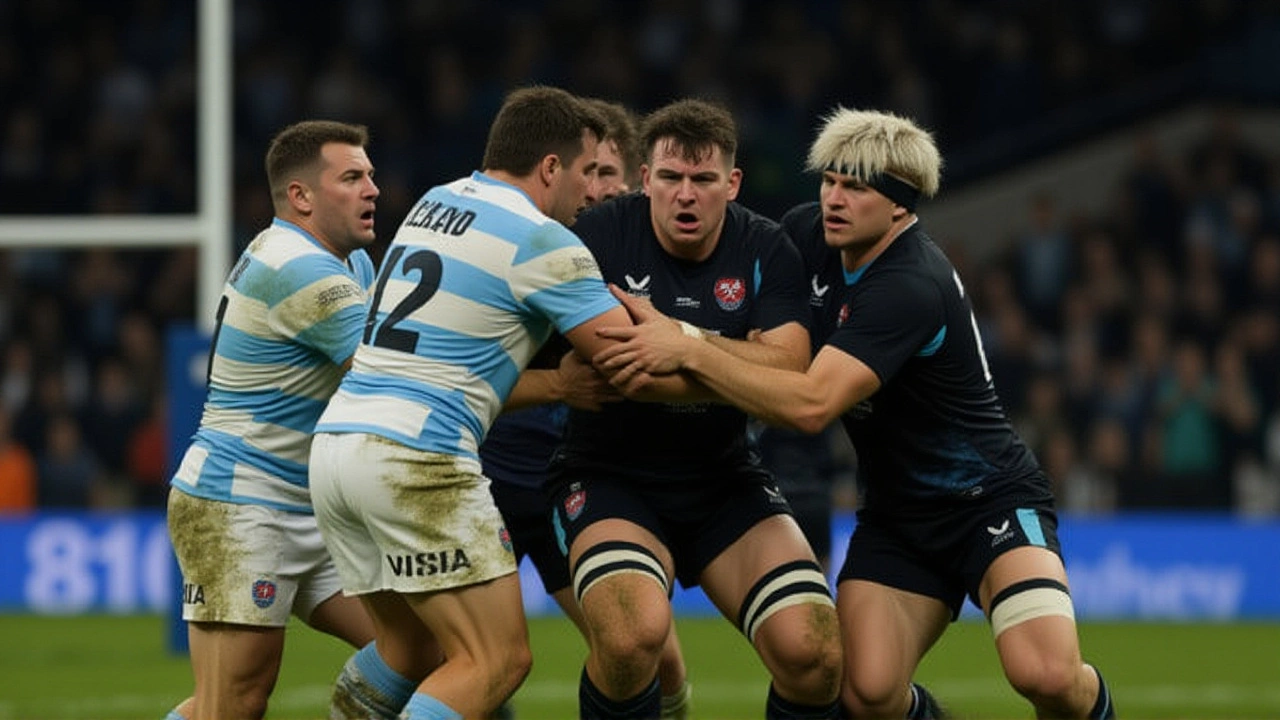On Sunday, November 23, 2025, England national rugby union team clawed back a late surge from Argentina national rugby union team to win their final 2025 Autumn International match — sealing an 11th straight victory and completing the Autumn Grand Slam. The win, confirmed by TNT Sports’ live commentary at 1:00 PM UTC, wasn’t pretty. But it was enough. Max Ojomoh, the dynamic center from Bath Rugby, sparked England’s attack with relentless energy, though his exact stats remain unreported. What’s clear is this: England won. And yet, the victory felt hollow.
Winning, But Not Convincing
The Autumn Grand Slam is more than a trophy — it’s a rite of passage. For England, it means sweeping all their November fixtures against Southern Hemisphere giants. This year, that included Argentina, Australia, New Zealand, and South Africa — though the full schedule wasn’t officially published. Their 11-match winning streak, now the longest since Clive Woodward’s 2003 World Cup-winning side, is a testament to consistency. But consistency doesn’t always equal dominance.Argentina, playing with desperation and flair, mounted a furious second-half comeback. Tries came from their backline, kicks found touch with precision, and their scrum finally held firm. England’s defense, usually a fortress, looked ragged. The final whistle didn’t bring celebration — it brought silence. And that’s when The Daily Telegraph struck with its verdict: "England’s jaded win over Argentina will not worry Springboks."
"Jaded" Isn’t Just a Word — It’s a Warning
"Jaded" means tired. Weary. Lacking spark. It’s not about the scoreline. It’s about the soul of the performance. The Daily Telegraph, Britain’s oldest national newspaper and a heavyweight in rugby analysis, didn’t mince words. Their piece, published at 2:15 PM UTC on the same day, didn’t question the result. It questioned the meaning of it.Why does this matter? Because the South African Rugby Union — and its national side, the Springboks — are waiting. The reigning World Cup champions, they’ve spent the last two years refining their physicality, their set-piece dominance, and their mental toughness. England’s win over Argentina, while statistically impressive, offered no evidence they can match that intensity. If anything, it showed the opposite: England are winning games they shouldn’t even be close to losing.
Think of it like this: You win a boxing match because your opponent slips on the ropes. You get the decision. But everyone in the arena knows you didn’t outbox them. That’s England right now.
Who’s Really Behind the Success?
Max Ojomoh was named the spark. He’s 23, fast, clever, and increasingly vital to England’s attack. But rugby isn’t won by one player. It’s built by cohesion — by forwards who dominate the gain line, by fly-halves who control tempo, by a defense that doesn’t break under pressure. None of that was evident against Argentina.England’s pack, usually their bedrock, looked slow to engage. Their lineouts were sloppy. Their breakdown work lacked aggression. And when Argentina pushed, England retreated. That’s not confidence. That’s fear. Fear of being exposed. Fear of losing control. Fear of facing the real test — not in November, but in June, or October 2027.

What This Means for the 2027 Rugby World Cup
The Autumn Grand Slam is a milestone. But it’s not the summit. The real mountains come later: the Six Nations, the July tours, and then, the World Cup in Australia. England’s coaching staff, led by Steve Borthwick, now face a dilemma: celebrate the streak, or confront the cracks?History offers a chilling parallel. In 2002, England won 11 straight under Woodward. Then they lost to South Africa in the 2003 World Cup pool stage — and still won the trophy. But that team had a different DNA. They were ruthless. They were feared. This team? They’re just lucky.
The Springboks won’t be fooled. Neither will New Zealand. Neither will France. And if England can’t fix their energy deficit — if they can’t rediscover the hunger that comes from being hunted, not the hunter — then their Grand Slam means nothing when the World Cup kicks off in October 2027.
What’s Next for England?
No one knows. No training camps have been announced. No squad changes hinted at. No interviews with players or coaches. Just silence from the England camp. Meanwhile, the Springboks are preparing for their own November tour — and they’ll be watching England’s footage with a smirk.The real test isn’t whether England can beat Argentina. It’s whether they can beat the truth: that they’re coasting. That their wins are becoming routine, not remarkable. That the fire is fading.
Frequently Asked Questions
What exactly is the Autumn Grand Slam in rugby?
The Autumn Grand Slam refers to the England national rugby team winning all their scheduled test matches during the November international window against Southern Hemisphere nations — typically Argentina, Australia, New Zealand, and South Africa. It’s a prestigious achievement, historically seen as a barometer of England’s global competitiveness outside the Six Nations. This year, they completed it with an 11th straight win, though the exact opponents and scores remain unconfirmed in public reports.
Why does The Daily Telegraph say England’s win won’t worry the Springboks?
The Telegraph’s analysis suggests England’s performance lacked intensity, structure, and conviction — traits the Springboks thrive on exploiting. While England won, they did so against a spirited but outclassed Argentina side. The Springboks, as reigning world champions, have demonstrated superior physicality and tactical discipline. England’s jaded display implies they’re not yet ready to challenge elite teams under pressure — exactly what the Springboks will demand in a World Cup clash.
Is Max Ojomoh the key to England’s future?
Ojomoh is undoubtedly a bright spot — his pace and decision-making offer England a rare attacking spark. But rugby isn’t won by one player. His influence is limited if the pack doesn’t dominate, if the scrum doesn’t hold, and if the defense doesn’t improve. He’s a solution, not the cure. England’s long-term success hinges on systemic fixes, not individual brilliance.
How does this compare to England’s 2003 World Cup-winning streak?
In 2002-2003, England’s 11-match winning streak under Clive Woodward was built on relentless physical dominance, tactical innovation, and a culture of fearlessness. Players like Martin Johnson and Jonny Wilkinson led by example. Today’s team wins through discipline and opponent errors — not superior execution. The 2003 side won the World Cup because they were the best team on the planet. This team? They’re just the luckiest.
Will England face South Africa soon?
No official fixtures have been announced yet, but the Springboks are scheduled to tour the Northern Hemisphere in November 2026 — a likely showdown with England. That match will be the true test of whether England’s Grand Slam was a triumph or a mirage. If they lose, or even win poorly, the doubts raised by The Daily Telegraph will become consensus.
What’s the biggest concern for England heading into the 2027 Rugby World Cup?
The biggest concern isn’t injury or selection — it’s mindset. England are winning games they shouldn’t be close to. They’re not pushing limits. They’re not taking risks. They’re not terrifying opponents. If they enter the 2027 World Cup with the same attitude — content to grind out wins rather than dominate — they’ll be eliminated in the quarterfinals by a team that still believes in winning, not just surviving.
